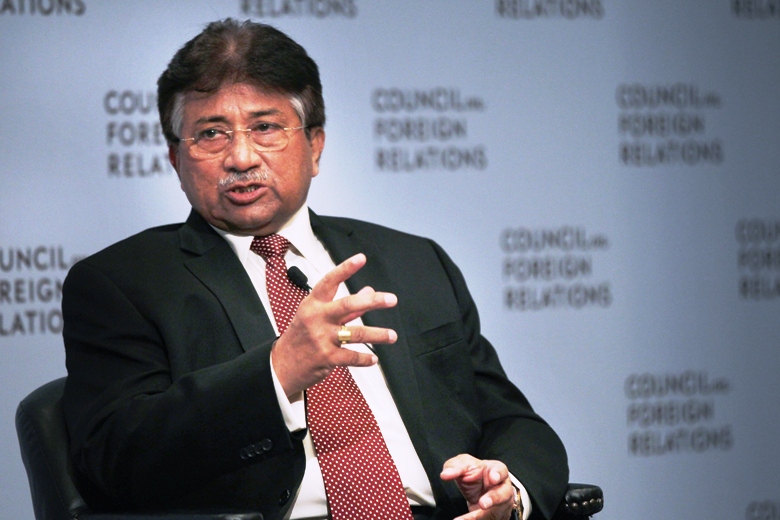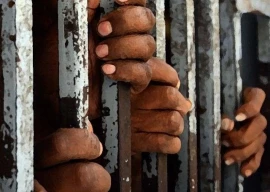
Nestled between the Prime Minister House and PM secretariat, the tranquil National Library – usually frequented by bookish CSS students – will witness history today (Tuesday).
Not many would have thought former president General (retd) Pervez Musharraf would find himself marching into the dock for a treason trial before a special court constituted on the library premises.
After being granted bail in the Benazir Bhutto and Bugti murder cases as well as the Lal Masjid hearing, the former military leader is the subject of national attention as he becomes the first ex-army chief to stand trial for treason in a special court today (Tuesday).
“The element of surprise is our most powerful weapon,” Ahmed Raza Kasuri of Musharraf’s legal team told The Express Tribune, when asked to comment on the former ruler’s possible appearance at the opening of the treason trial against him.

Having just returned from the farmhouse that served as Musharraf’s sub-jail, Kasuri says the man of the moment is not under pressure. “He is hale and hearty. Very confident and cheerful,” he said.
Kasuri said that the venue of the treason hearing was changed from the Federal Shariat Court to the expansive National Library as the former is not spacious enough to hold the press pouring in from all over the world.
“Entry will be strictly monitored. Journalists must take passes from the registrar of the special court and will not be allowed without them.”
Justice Faisal Arab, Justice Tahira Safdar and Justice Yawar Ali are on the three-member bench of the special court.
In a petition submitted by his counsel Advocate Ibrahim Satti on Monday, Musharraf approached the apex court seeking a stay order on the trial. It maintained that in the past, five “deviations” (coups) were validated by the courts and parliament and November 3, 2007 deviation was a similar state necessity for the good of the people.
It also said that the prime minister and top military generals were consulted before the emergency was imposed, and further challenged the July 31, 2009 judgment of the apex court.
“The petitioner, Musharraf, in the capacity of chief of army staff was compelled to issue promulgation of emergency on November 3, 2007 after reviewing the situation in meetings with prime minister, governors of all four provinces and with chairman joint chief of staff committee, vice chief of army staff and corps commanders of Pakistan army,” the petition stated. “Everyone had accepted emergency rule and the National Assembly also adopted a resolution in favour of emergency,” Musharraf held in his petition.
Musharraf requested that the apex court accept his review petition as was done in Nawaz Sharif’s case. He also conceded in the petition that without imposing emergency there was no other way to remove former chief justice Iftikhar Chaudhry as it was not possible under Article 209 of the constitution.
The July 31, 2009 judgment is the main evidence against Musharraf for his act to abrogate the constitution, the petition stated, appealing for review of this judgment. With a reference to some incidents of the past, the petition stated that due to differences between Justice (retd) Chaudhry and Musharraf, the judgment was rendered against the emergency.
The review petition also held that Musharraf filed a reference against Justice Chaudhry and later declared emergency on November 3 on the advice of then prime minister Shaukat Aziz. The letter of Shaukat Aziz has also been attached with the petition.
The petition stated that no person has been tried under Article 6 of the constitution in the past for holding the constitution in abeyance, and even the apex court’s judgment has not asked for a trial against Musharraf. It maintained that the SC is silent on the issue because holding the constitution in abeyance is not tantamount to high treason before the 18th constitutional amendment.
IHC rejects three petitions
The Islamabad High Court (IHC) on Monday dismissed all three petitions filed by former President General (retd) Pervez Musharraf against the special court to try him for treason under Article 6 of the constitution.
The former president had filed three petitions challenging his trial by a special court, the composition of the special court and the appointment of Akram Sheikh as prosecutor. However, Justice Riaz Ahmed Khan rejected all the petitions in a short order.
Musharraf’s counsel Dr Khalid Ranjha argued that his client had imposed emergency when he was holding office in the Pakistan Army and by virtue of Section 92 of the Pakistan Army Act 1952. Musharraf remains the subject of the Army Act even after retirement.
He contended that the special court constituted for his trial, lack jurisdiction and only a military court under section 2 (b) (iii) could try him for the alleged offence.
Published in The Express Tribune, December 24th, 2013.
COMMENTS (10)
Comments are moderated and generally will be posted if they are on-topic and not abusive.
For more information, please see our Comments FAQ


1725443747-0/Untitled-design-(5)1725443747-0-165x106.webp)














Musharraf is a brave leader, not a run away, wheeler and dealer person.
@Mirza:
Sir, Turkey and Malysia are making prgress becuase their politicians have put themslevs on the right track e.g.economy and development, our rulers are still confused they dont know what should be the first priorty and what nation needs?Thus vision and effeciency matter not the type of rule.
Constitution binds the provinces together. If there is no constitution there is no federation and no Pakistan. The at will mentality and going against the elected govts and one man's rule has brought us to this stage. If we continue to ignore constitution then more provinces would leave the federation. There is no limit for hatred toward modernity, democracy and unbound love for one man's rule. Look all these Muslim dictatorships are way behind the world and a few of us Turkey, Malaysia are making progress. What is wrong if Mush is brought to justice. When the same CJ was bringing elected PM in the court and punishing them where were these people who now are against judiciary?
Constitution binds the provinces together. If there is no constitution there is no federation and no Pakistan. The at will mentality and going against the elected govts and one man's rule has brought us to this stage. If we continue to ignore constitution then more provinces would leave the federation. There is no limit for hatred toward modernity, democracy and unbound love for one man's rule. Look all these Muslim dictatorships are way behind the world and a few of us Turkey, Malaysia are making progress.
@Ch. Allah Daad: Corruption is a more serious crime and violation of Constitution. Why is no one tried for that and penalized?
@Ch. Allah Daad:
Why only HE why not all partners those enjoyed the fruit of power.
I think country is more important than constitution. Musharraf did everything to save Pakistan.
nothing will happen. Generals in reality are above law and constitution in this country
Justice must be done. If violation of Oath and abrogation of Constitution is no crime then he will not be found guilty.
Really a Brave man . The real Definition of a Commando. Long alive General Saab facing Judicial Activism and Personal Victimization. Et block my comment as you always do .